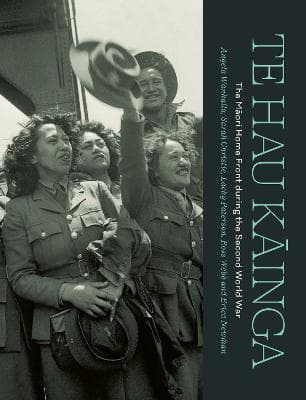
Te Hau Kāinga: The Māori Home Front during the Second World War
Find your copy...
Taking readers to the farms and factories, the marae and churches where Māori lived, worked and raised their families, Te Hau Kāinga tells the story of the profound transformation in Māori life during the Second World War.
While the Maori Battalion fought overseas, the Māori War Effort Organisation and its tribal committees engaged Māori men and women throughout Aotearoa in the home guard, the women's auxiliary forces, and national agricultural and industrial production. Māori mobilisation was an exercise of rangatiratanga and it changed how Māori engaged with the state. And, as Māori men and women took up new roles, the war was to become a watershed event for Māori society that set the stage for post-war urbanisation.
From ammunition factories to kūmara fields, from Te Puea Hērangi to Te Paipera Tapu, Te Hau Kainga provides the first substantial account of how hapori Māori were shaped by the wartime experience at home. It is a story
of sacrifice and remarkable resilience among whānau, hapū and iwi Māori.
Te Hau Kainga is published alongside its companion volume Raupanga: Ngā Pito Kōrero o te Pakanga Tuarua nō te Hau Kāinga, edited by Angela Wanhalla and Lachy Paterson. Raupanga features thirty-five succinct, illustrated essays exploring the Māori home front, translated into te reo Māori by Lachy Paterson.
About the Author
Sarah Christie was a postdoctoral fellow in the History Programme at Ōtākou Whakāihu Waka, where she completed her doctorate on the social and cultural histories of women in the workforce in New Zealand. She is currently a
researcher at the Ngāi Tahu Archive, Christchurch.
Erica Newman (Ngāpuhi) is a senior lecturer at Te Tumu: School of Maori, Pacific and Indigenous Studies at Ōtākou Whakāihu Waka. She researches adoption, whāngai, kinship and identity (internationally and nationally) with a
focus on Indigenous perspectives, and has published on transracial adoption in New Zealand. Erica was awarded a Marsden Fund Fast-Start grant to explore the intergenerational impact of the 1955 Adoption Act and to journey with
descendants of Māori adoptees who are searching for their tūrangawaewae.
Lachy Paterson is emeritus professor at Te Tumu, Ōtākou Whakāihu Waka, where he taught te reo Māori and Māori history. He researches Māori history, especially relating to newspapers and other texts in Māori, and the relationship between Māori and the government in the nineteenth and first half of the twentieth century.
Angela Wanhalla (Ngāi Tahu, Ngāi Te Ruahikihiki, Pākehā) is a professor in the History Programme, Ōtākou Whakāihu Waka. Her primary research area is Māori women's history. Her most recent book is Of Love and War: Pacific Brides of
World War II (University of Nebraska Press, 2023).
Ross Webb has a PhD from Victoria University of Wellington and is a historian with an interest in organised labour and oral history. He is principal researcher analyst in the Research Team at the Waitangi Tribunal Unit, and is working on a book, 'In Defence of Living Standards: The Federation of Labour, Politics, and Economic Crisis, 1975-1987'.





